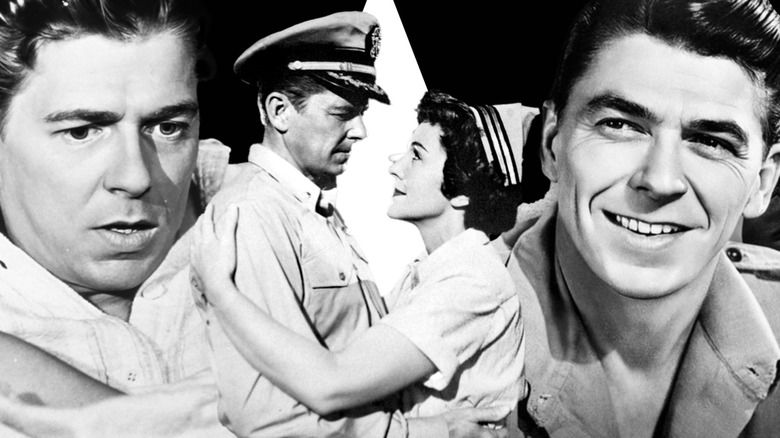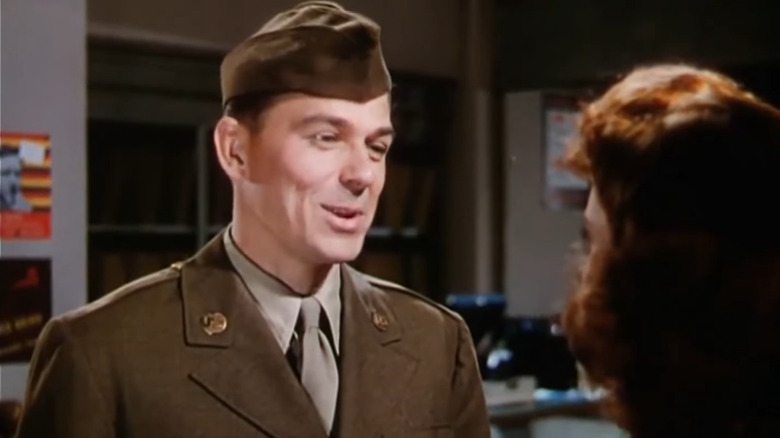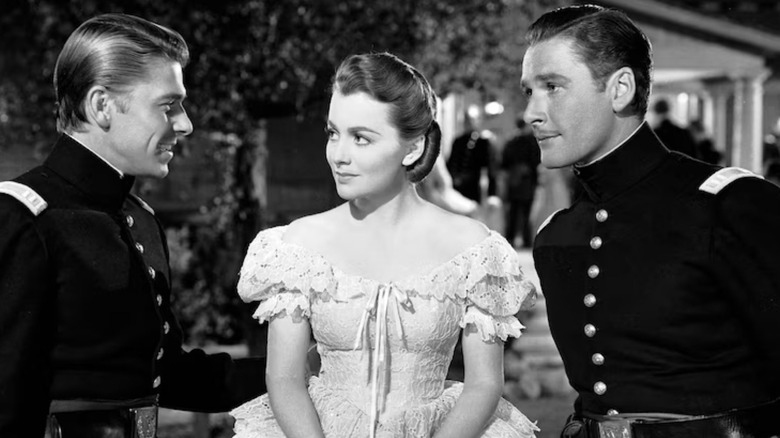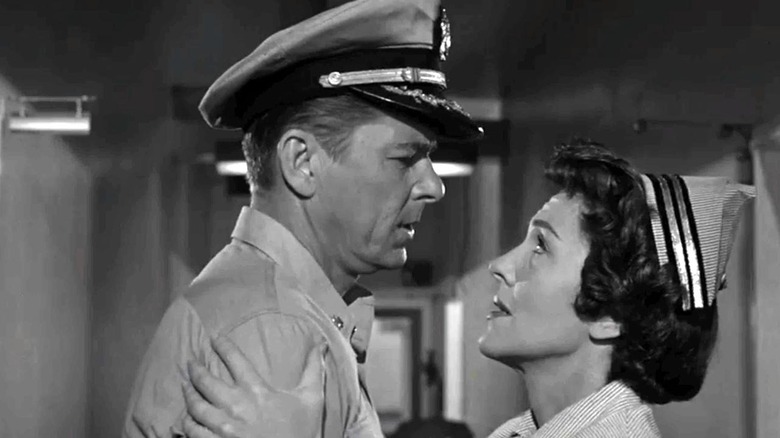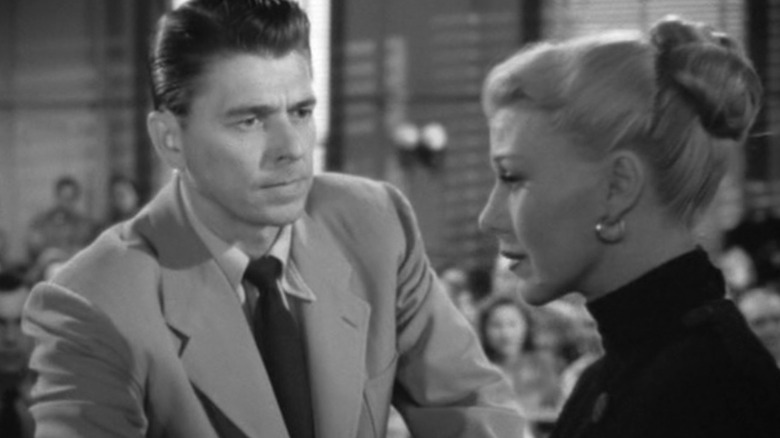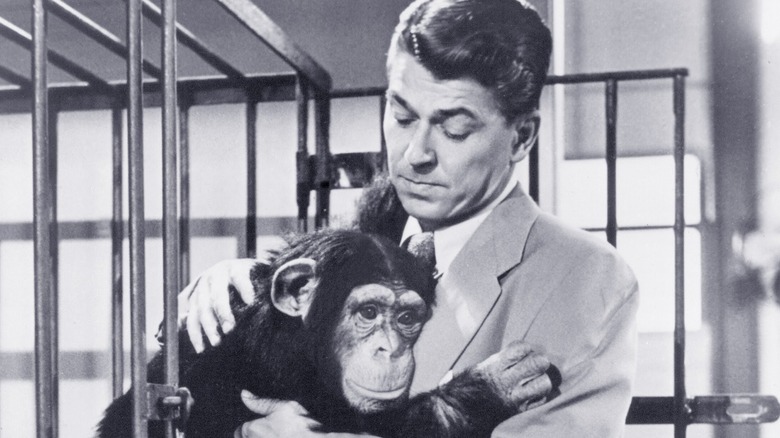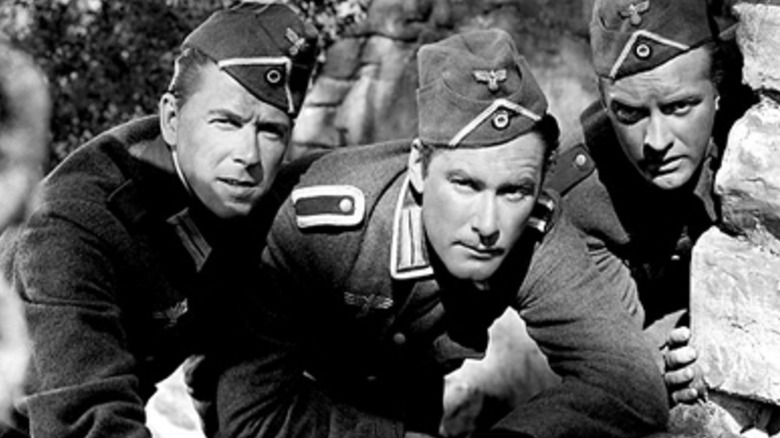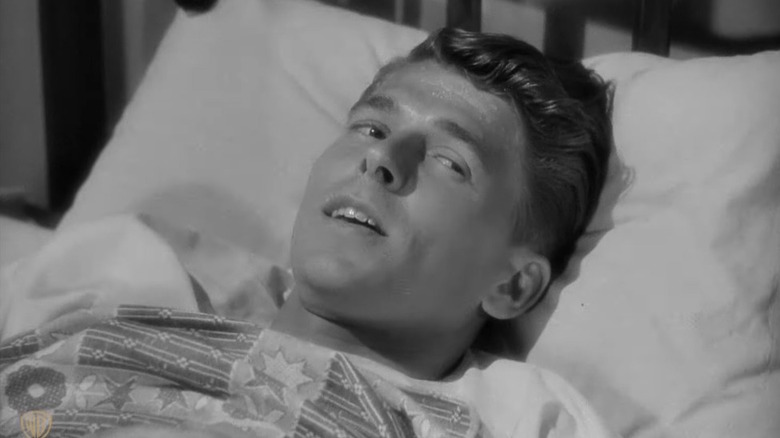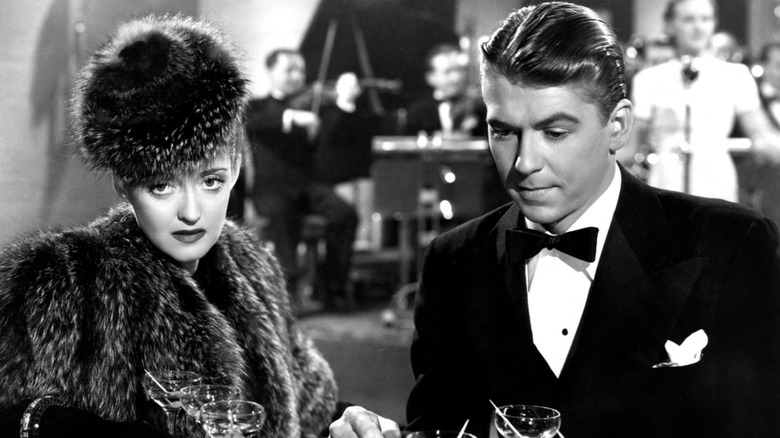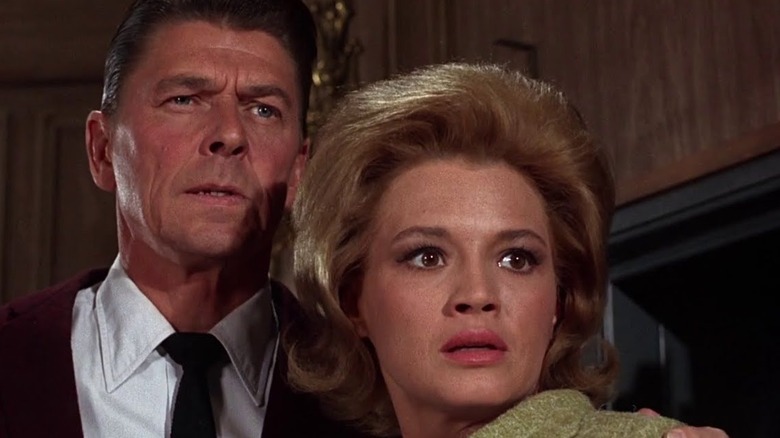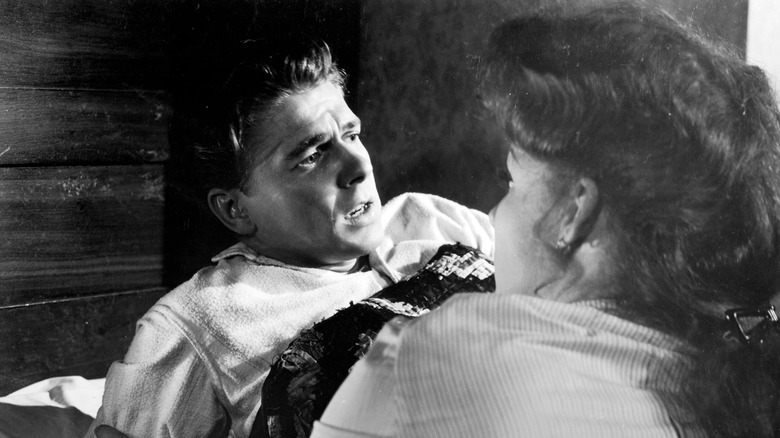The 10 Best Ronald Reagan Movies, Ranked
You probably know more about Ronald Reagan from U.S. History than Film Studies. Make no mistake. Before Reagan ever ran for office, he was an actor. The 40th U.S. president started his entertainment career as "Dutch" Reagan, a radio sports announcer in Des Moines, Iowa. Reagan honed his storytelling chops by recreating Chicago Cubs games with nothing but a slip sent to him by telegraph. The 26-year-old dreamed of big-screen stardom, so he joined the Cubs for spring training in Southern California — to snag a screen test with Warner Brothers. The WB studio suits liked what they saw, and film actor Ronald Reagan was born.
While Reagan had a better Hollywood career than most, he never became a bonafide movie star. Throughout Reagan's political career, opponents and detractors slandered him as a "B-movie actor." However, Reagan was a B-movie actor. No, he wasn't starring in the 1940s equivalent of "Sharknado" (though that would have been awesome). Back in the day, B-movies were primarily studio pics with smaller budgets and thus less-famous stars. So if a part wasn't big enough for Gary Cooper or James Stewart, it would go to guys like Reagan. Many of Reagan's movies are pretty good, too. Sure, some of them are truly terrible, but that's true of any actor. Whatever the role, Reagan showcased the charisma that took him all the way to the White House. If you're ready to know more about Reagan the actor, start with these 10 films.
10. This Is The Army
Wartime propaganda gets a bad rap, and mostly, it's deserved. But when your enemies are the Axis powers, propaganda isn't so bad — especially when it's set to the music of Irving Berlin! Ronald Reagan was a cavalry officer in the U.S. Army during World War II but was classified for limited service because of his poor eyesight. So rather than being sent to Europe or the South Pacific, Reagan stayed in Los Angeles, making training films for an Army film unit. It wasn't the best thing for his movie career, but it beat getting shot at. One of Reagan's biggest and best wartime roles was in the musical comedy propaganda film "This Is The Army."
Released in 1943, "This Is The Army" is as American as apple pie and just as sweet, though too much may make you sick. Reagan plays Johnny Jones, whose World War I vet father stages a musical to cheer up the boys going to battle in World War II. So it's kinda like a wartime "White Christmas." Like most "let's put on a show!" musicals, the principals can somehow afford a Broadway-sized production, but no matter. "This Is The Army” isn't supposed to be real. It's supposed to make you feel — happy, distracted, anything but glum. "Saving Private Ryan," this is not. Despite its borderline schmaltz, "This Is The Army" beautifully boosted troop morale in 1943 and still puts a star-spangled smile on your face.
9. Santa Fe Trail
Errol Flynn and Ronald Reagan only made two movies together, and while they weren't exactly Paul Newman and Robert Redford, their on-screen chemistry was tough to beat. At face value, the skirt-chasing, swashbuckling Australian Flynn and the clean-cut, all-American Reagan sound like a mismatched cinematic duo, but that's what made it work. Their first film was the 1940 "historical" Western "Santa Fe Trail." I put "historical" in quotation marks because it's a very one-sided reframing of history, as was common at the time. Your appetite for this type of film may vary, though it's more "Gone With The Wind" than "The Birth of Nation."
Flynn and Reagan played Jeb Stuart and George Custer, respectively, West Point graduates stationed at Fort Leavenworth, Kansas. There, the old friends must join forces to stop the radical abolitionist John Brown (Raymond Massey) while competing for the heart of "Kit Carson" Holliday (Olivia de Havilland). Painting an anti-slave revolutionary as a bloodthirsty terrorist is certainly a choice, but this style of storytelling was all too common in old Hollywood. If you can get past that (admittedly a big ask), you'll find "Santa Fe Trail" is a rousing adventure, deftly directed by Michael Curtiz and anchored by commanding performances across the board. Reagan and Flynn are dynamic as friends and romantic rivals, yet their chemistry is bested by Flynn and his longtime collaborator de Havilland in their seventh and second-to-last pairing.
8. Hellcats of the Navy
Ronald Reagan wasn't the only actor in the White House. His wife, Nancy, was the first actress to be first lady unless you count Edith Wilson, who acted as president after her husband Woodrow suffered a debilitating stroke. Ronald and Nancy Reagan appeared in just one movie together, 1957's "Hellcats of the Navy," making this the only film to feature a future president and future first lady.
While its title makes "Hellcats of the Navy" sound like a rip-roaring World War II adventure film in the mold of 1943's "Destination Tokyo" or 1961's "The Guns of Navarone," it is more of a romantic drama. Reagan plays Cmdr. Casey Abbott, an American submarine commander forced to leave a man behind when a mission in the Pacific goes wrong. The problem is the man left behind is also pursuing Abbott's love interest, Helen (future Mrs. Reagan Nancy Davis), leading to suspicions of ulterior motives.
Reagan was getting more TV work by this point in his career and was disappointed in the quality of roles he was offered, including this one. I think Reagan was too harsh. "Hellcats of the Navy" isn't a wartime masterpiece by any means, but it is a solid B-movie carried by solid performances by the future first couple. If nothing else, "Hellcats of the Navy" is worth watching for its historical value, though Reagan was in better movies.
7. Storm Warning
"Storm Warning" came out nearly four decades before John Grisham published "A Time To Kill," but it seems like the sort of story the best-selling author would write. Ginger Rogers stars as Marsha Mitchell, a traveling model who stops in a Southern town to visit her newlywed sister, Lucy (Doris Day). Her visit goes south (pun intended) when she witnesses a Klan murder and later realizes her new brother-in-law is one of the murderous KKK members. Ronald Reagan plays crusading district attorney Burt Rainey, who works with Marsha to bring the Klan members to justice. And here you probably thought that "Storm Warning" was a weather-related disaster movie!
"Storm Warning" was especially violent and graphic for 1951, signaling a new era for mainstream filmmaking. It was a departure for Rogers, who became a movie star spouting one-liners in urbane comedies or tap-dancing with Fred Astaire. She shines in this Warner Brothers film noir, though Reagan more than holds his own. What the performance lacks in nuance, Reagan makes up for in gravitas. This isn't a shades-of-gray portrayal but simply a good guy being good while everybody else is evil. Social crusading is tough to pull off without being preachy, but both Reagan and the film manage to be both thought-provoking and thrilling.
6. Bedtime For Bonzo
Yes, I'm going to defend "Bedtime For Bonzo!" If Ronald Reagan could have erased one movie from his filmography, it wouldn't surprise me if it were "Bonzo." Not because it's bad or he hated it, but the 1951 comedy wound up becoming the poster child (or should I say "poster chimp?") of his sagging movie career. Many people, if forced to name a Reagan movie, would probably say, "that one with the monkey?" I'm going to come out and say it right now. "Bedtime For Bonzo" deserves better!
Reagan plays Prof. Peter Boyd, whose engagement to his college dean's daughter is called off by her father after the old man finds out that Boyd's dad was a criminal, believing criminality is hereditary. Boyd tries to settle the debate between "nature vs. nurture" once and for all in the most sensible way possible (for a silly 1950s screwball comedy) — by raising a chimp as a human. "Bedtime For Bonzo" was the "Air Bud" of its day — good for some light entertainment and easy humor, even if you're rolling your eyes as much as you're laughing. All due respect to "Dunston Checks In" fans, but "Bedtime For Bonzo" is arguably the best simian cinematic endeavor and the most historically significant (if you don't count "King Kong"). Reagan manages to escape with his dignity intact by leaning into the humor and not slipping on the proverbial banana peel (though his co-star did try to kill him).
5. Desperate Journey
"Desperate Journey" is the second and final cinematic pairing of Errol Flynn and Ronald Reagan — and definitely the best. Flynn plays Royal Air Force Officer Terry Forbes, who, along with Flying Officers Johnny Hammond (Reagan) and Jed Forest (Arthur Kennedy), must make a "desperate journey" across Germany after crashing behind enemy lines during World War II. The film was directed by Raoul Walsh, who was prolific in many genres but especially gifted in adventure. It would be easy to dismiss "Desperate Journey" as wartime propaganda, but that would be a mistake. Yes, the 1942 movie was absolutely meant to showcase the heroism of the Allies ("God Save the King" is even played throughout), but it also knows the best way to promote a message is to tell a good story.
In addition to Walsh's deft direction, "Desperate Journey" features compelling performances. These aren't just studio contract players phoning it in for an easy paycheck but enthusiastic actors who believe in the story they're telling — and who they're telling it for. Following his scene-stealing performance in 1942's "King's Row," Reagan was at his peak as a movie star in "Desperate Journey," sharing top billing with Flynn. He also got the movie's signature scene despite top star Flynn lobbying hard for it, suggesting the producer saw big things for Reagan. However, it was not to be. Reagan was called into service during production, and his film career never reached the same levels.
4. Knute Rockne, All American
"Knute Rockne, All American" features Ronald Reagan in a supporting role, but it is arguably his most famous performance. Reagan plays George Gipp in the 1940 biopic, a star freshman halfback who plays for the Notre Dame Fighting Irish under coach Knute Rockne. The movie is actually about Rockne, but you wouldn't know that from its legacy.
The film's most memorable scene shows Gipp lying on his deathbed, telling his teammates, "Tell 'em to go out there with all they got and win just one for the Gipper." It's a line that landed #89 on the American Film Institute's "100 Years...100 Movie quotes" list. More significantly, "The Gipper" went from being the real-life George Gipp's nickname to Reagan's. He even deployed the line to thunderous applause at the 1988 Republican National Convention when he told Vice President George Bush to "win one for the Gipper!" If your nearly 50-year-old line still pops the crowd, you know it's good.
It wasn't just the line but the speaker, as Reagan's boyish innocence and pained delivery made the scene and stole the movie. That said, "Knute Rockne" is way more than just one line. Star Pat O'Brien gives a commanding performance in the title role as the innovator behind the forward pass as a player and molder of character as a coach. It's a touching tribute that set the bar for future sports movies and continues to inspire more than eight decades after its release.
3. Dark Victory
In the 1930s, Bette Davis was a huge movie star. How huge? In 1939's "Dark Victory," she got top billing over George Brent, Humphrey Bogart, and Ronald Reagan. There's no denying who moviegoers were buying a ticket to see.
Davis plays wealthy socialite Judith Traherne, whose only joy is riding horses. A ridiculously rich woman bored with her privileged life is a hard character to sympathize with, but Davis makes you care. Of course, you can't help but feel for the mercurial heiress when she discovers she's losing her eyesight and dying of a brain tumor. And she falls in love with her doctor (Brent) while being pursued by her horse trainer (Bogart) and a playboy (Reagan).
"Dark Victory" sounds like a sappy soap opera, but it's a melodramatic masterpiece. Melodrama has a bad reputation, but nobody did it better than Warner Brothers, especially with Davis. But what about her co-star, Ronald Reagan? While he looks the part and is game, Reagan was better playing the nice guy, not the playboy. "Dark Victory" is arguably the best movie Reagan was in, but it was not the movie he was best in (if that makes sense). "Dark Victory" belongs in Regan's top five, but this film is Davis' victory, not his.
2. The Killers
Ronald Reagan's shot at A-list superstardom had long passed him by 1964. Meanwhile, he ditched the leading man roles he was getting in B-pictures to become a TV star and General Electric spokesperson. Still, Reagan couldn't pass up the opportunity for a supporting role in Don Siegel's "The Killers." It's hard to explain "The Killers" without spoiling it, but it's kind of a cross between "Rashomon" and "Reservoir Dogs." Lee Marvin and Clu Gulager play hit men hired to kill a man who ran on the wrong side of a gangster who's pretending to be a legitimate businessman. Reagan plays the gangster in a major departure from his good-guy screen image.
Seeing the Gipper go Tony Soprano is perhaps even more jarring today than it was in 1964. It's clear watching "The Killers" that Reagan relished the opportunity to break bad, but it was rumored he regretted making the movie — maybe because he entered electoral politics right after and playing an unrepentant bad guy (who slaps co-star Angie Dickinson) made for, well, "bad" optics. "The Killers" was originally produced as a made-for-TV movie but was deemed too violent by NBC and got a theatrical release instead. Reagan retired from films with a bang (literally), as "The Killers" was not only his only villainous role but one of his greatest. While Reagan could have had a late-career renaissance playing heavies, he had other plans, becoming California's governor in 1966.
1. King's Row
"Ronald Reagan can't act" is a myth that followed him throughout his political career and continues to this day. It's also not true. "King's Row" is proof. Based on Henry Bellamann's novel of the same name, "King's Row" feels like John Steinbeck's "East of Eden" crossed with Thornton Wilder's "Our Town."
Set in the quiet town of King's Row in the late 1800s, the film stars Reagan as wealthy pretty boy Drake McHugh who is forced to work when he loses his trust fund. When McHugh's legs are injured in an accident, a vengeful doctor (the disapproving father of one of McHugh's lady friends) unnecessarily amputates them. This leads to the movie's signature scene and the finest acting of Reagan's film career. Upon discovering his legs are gone, the shocked, grief-stricken McHugh screams, "Where's the rest of me?"
While "win one for the Gipper" eventually became Reagan's most famous movie quote, he felt such a connection to "Where's the rest of me?" that he made it the title of his 1965 autobiography during his run for governor. "King's Row" was nominated for three Oscars, but surprisingly, Reagan wasn't nominated. The feeling in Hollywood must have been "Reagan's time will come," but it never did (at least in the movie business). Reagan didn't become an A-list movie star, but "King's Row" proved his potential, and it remains the greatest Ronald Reagan movie.
